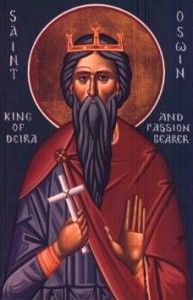We are reminded many times in Holy Scripture and in the witness of the saints that the Christian way of life is for all people and that God makes no distinctions among his children. There is neither rich nor poor, high or low estate, “neither slave nor free, there is neither male nor female; for [we] are all one in Christ Jesus.” [Galatians 3:28]
At the top of the social spectrum, we find an example of sainthood in St. Oswald, King of Northumbria. With a high social position comes honor and power, but also a greater chance of rivalry, betrayal and assassination. This happened to Oswald’s father, King Ethelfrith, who was killed by rivals and was succeeded by his brother-in-law, Edwin, in 616.
Oswald fled to safety among the Scots. There he discovered the peace and tranquility of St. Columba’s monastery on the island of Iona. Through the example and teaching of the monks, Oswald was converted from paganism to Christianity, was baptized, and became a devout follower of Christ.
When his uncle Edwin died in 633, Oswald returned to Northumbria and was crowned king. The new king continued to be plagued by warring neighbors, but eventually was able to establish peace. He wished also for spiritual peace for the people of Northumbria and so sent to Iona requesting monks to come and preach the faith in his land.
After the first monk who had been sent returned to Iona quickly with dismal reports, the Irish monk, Aidan, was chosen and was made a bishop for this work. His perseverance resulted in genuine conversions among the king’s subjects.
Before Bishop Aidan gained sufficient proficiency in the English language, King Oswald went with him as he traveled about teaching, and the king acted as translator, ensuring that the people clearly understood the precepts of the faith.
King Oswald gave Bishop Aidan an island in this land, and the great monastery of Lindisfarne was established, soon flourishing with the vocations of Northumbrian men. The king also built churches for the people, and through his example – and without coercion – many of his subjects gave up the old life and became Christians.
Oswald was a true Christian ruler. Unlike most of his predecessors, he treated his subjects with fairness and generosity, being especially attentive to the needs of the poor. One story is told of a Paschal meal which he was sharing with Bishop Aidan. An attendant came to tell him that there was a crowd of poor people outside asking for assistance. The king sent his meal – a large silver tray laden with meat – to the people outside, providing them with food and silver that he ordered to be broken up and distributed among them. The bishop, wishing to acknowledge the king’s generosity, took his hand and expressed the desire that this generous hand would live forever. This figure of speech was remembered many years later, when the king’s relics remained incorrupt.
Unfortunately the temporal peace of Northumbria was not to last. After an 8-year reign, King Oswald was challenged by the violent pagan ruler of Mercia, Penda, who brought a great army of warriors against the king’s forces. Oswald was killed on August 5, 642, praying for the souls of the soldiers with his last breath. Penda had his body dismembered and his head placed on a pole as a sign of his victory. But, as the saintliness of King Oswald had been acknowledged by his people during his lifetime, they now recognized his remains as holy relics, and took them to Lindisfarne monastery to be kept in the chapel for veneration. The presence of these relics brought about miracles of healing and reconciliation. Many years later, during the Danish invasions when the Lindisfarne monks had to escape with their precious Gospel books and relics, St. Oswald’s head was placed in the same reliquary as the incorrupt body of St. Cuthbert and eventually buried in Durham Cathedral, where these relics remain today. We honor St. Oswald on his heavenly birthday, August 5.
All kings shall fall down before him; all nations shall do him service. [Psalm 72:11]
